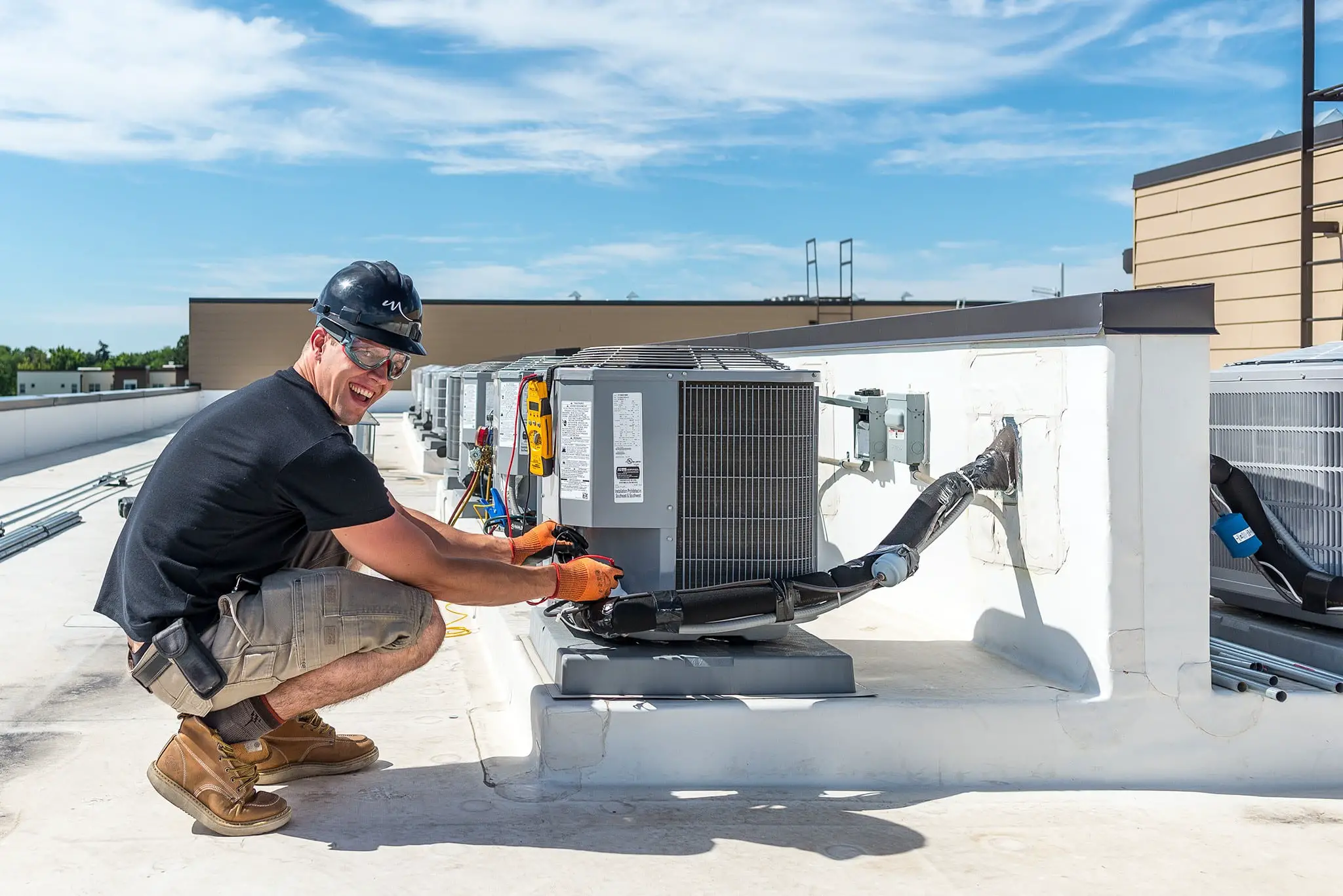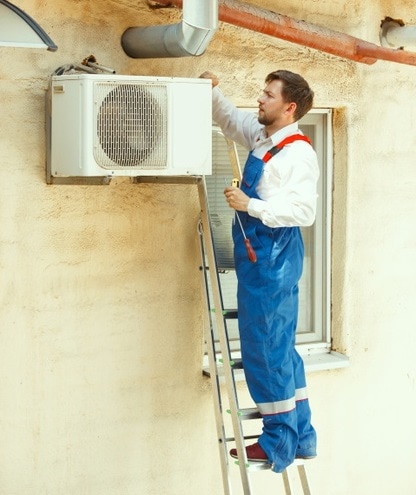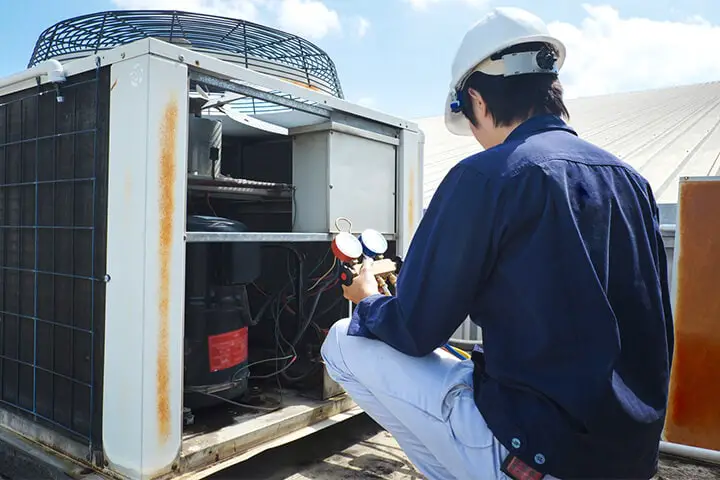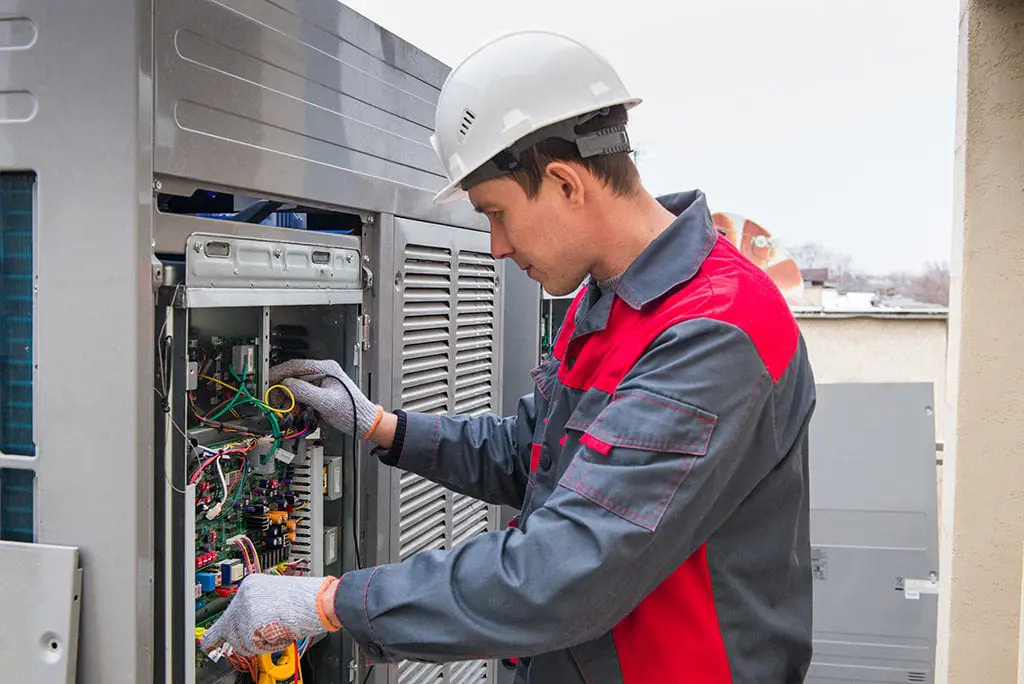Looking to learn HVAC in the state of Hawaii?
Wondering about certifications, licenses, of becoming an HVAC contractor?
Now is a great time to pursue further education within the field. The median salary in Hawaii for HVAC techs one of the highest in the country coming in at an impressive $61,330 annually. This article will serve as a guide to HVAC training and certifications within the state.

How to Become an HVAC Technician in Hawaii
HVAC stands for heating, venting, and air conditioning. It constitutes a system that is maintained by proficient workers commonly referred to as HVAC technicians.
So, an HVAC technician is essentially responsible for fixing, repairing, and installing HVAC systems and refrigerants coupled with other correlated duties. Owing to Hawaii’s tropical climate and reliance on its residents on climate-controlled systems, this job promises high growth prospects in a strong industry.
In regards to the formal procedure through which you can become one in the state of Hawaii, here’s what you need to know:
- There’s no requirement to own an HVAC license to land entry-level work.
- For technicians that intend to put working on refrigerants as a part of their job description, EPA section 608 certification is an imperative document to have.
- There’s also the issue of intense competition as with any other work sector, so it’s advised to acquire a contractor’s license through the Board of Professional Vocational Licensing, so you have the edge over other technicians and are able to procure more jobs.
- The minimum criteria set by employers demand candidates to own a high school diploma or GED with further two or more years of experience in a similar position.
- If you want to obtain experience, try opting for an apprenticeship or a level 3 educational plan as training is imperative, whether you’re a beginner or an expert.
- A blend of educational certifications and on-the-job training will enable you to pursue a successful career path in this field. Take help from the following mentioned apprenticeship programs, certifications, and licenses to help your research.
What Makes Hawaii a Great Place to Start an HVAC Career?
If you’re an HVAC technician trying to find work with contracting companies and you’ve done your thorough research, chances are you’re well aware that Hawaii is one of the most promising places to jump-start your career, why is that? Let’s have a look:
No Requirement of Training
For a workman to start his career in the HVAC industry, there’s no formal requirement of training. Although training will provide a competitive advantage over your peers, it’s a great way to enter the business and explore your areas of interest and pick your specialty because there’s no prior training prerequisite holding you back.

Provision of Myriad Benefits
HVAC technicians operating in Hawaii are able to take advantage of the myriad of benefits provided by the state’s local unions and organizations. Different associations provide a unique set of perks encompassing on-the-job training plans, apprenticeship programs, continuing education, pension plans, professional advocacy, etc.
Huge Growth Prospects
Since Hawaii is a state exhibiting climatic conditions on the warmer side with small changes in temperature as there’s a shift between seasons, there’s a huge demand and use of air conditioning and heating systems.
Evidently, this makes the state a fairly strong geographical region in terms of growing employment opportunities in a powerful industry that’s essentially snowballing as the years pass by. Hence, HVAC technicians can have a reliable and consistent career here all year round.
High Demand for HVAC Technicians
The demand for skilled HVAC technicians in the state of Hawaii is quite high and continues to grow every year; hence there is little saturation in the industry for this particular region, so there’s something for everybody!
It’s highly unlikely that you’ll stay unemployed in this state as a climate control system technician.
Financial Gains
Hawaii is third in number when it comes to the highest paying states in the US for HVAC workers. The average salary for the employees is around $62,540 annually, and this is only for less experienced workers. Hence, the state is extremely attractive because of the multitude of financial gains it has to offer.
HVAC Licensing Requirements for Hawaii
To become an HVAC tech in Hawaii you will not need any licensing or certifications. Only contractors will need licensing in their specialty trade. This is convenient for those HVAC techs who have attended a vocational school or have already gained hands-on experience.
Contractor’s Licensing Requirements in Hawaii

- Worker’s compensation insurance
- Bodily injury liability minimum of $100,00 per person and $300,000 per occurrence
- Property damage liability of $50,000 per occurrence
- Proof of business residency
- Four years of, recent (within the past 10 years) full-time supervisory work as a journeyman, foreman, supervisor, or contractor in the field (like refrigeration if you would like to pursue a C-40)
- Pass business, law, and trade exams
- Pay $50 application fee
- Contractor’s fees once you pass your exam is $545 if you have been licensed between October 1st of an even-numbered year and September 30th of an odd numbered year
- If you have been licensed between October 1st of the odd-numbered year and September 30th of the even-numbered year the fee is $415
- If you are not the business owner but a Responsible Managing Employee the fee is $335 between October 1st of the even-numbered year and September 30th of the odd numbered year and $225 if licensed between October 1st of the odd-numbered year and September 30th of an even numbered.
EPA Certification Requirements
Under the EPA Section 608 of the Clean Air Act, it is required that techs who work with any equipment that is liable to release refrigerants that could harm the atmosphere must be certified, making it a great companion certification to a C-40 Refrigeration Contractors License.
You must pass an EPA test to get your Section 608 Tech Certification. Technicians are required to pass an EPA-approved test to earn Section 608 Technician Certification.
There are three different certification types a technician can acquire:
EPA Section 608 HVAC Type I
Certifies techs to work on small appliances containing five pounds of less of refrigerant
EPA Section 608 HVAC Type II
Allows techs to work with high and very high pressure appliances, including non-automotive systems and split systems.
EPA Section 608 HVAC Type III
This certification permits techs to work on low-pressure appliances
Apprenticeship and Educational Diplomas
- Honolulu Joint Apprenticeship and Training Committee for the Plumbing and Pipefitting Local Union 675
- Programs accredited by PAHRA (Partnership for Air-Conditioning, Heating, Refrigeration Accreditation) or HVAC Excellence
While there are no current universities in Hawaii that offer the latter educational program, you can attain a certificate of achievement or an Associate of Applied Science (AAS) degree through Honolulu Community College. Both programs have a duration of two years.

Certifications
- The EPA Section 608 certification by the U.S. Environmental Protection Agency (EPA) for technicians who intend to handle refrigerants
This certification involves four categories, depending on the magnitude and type of appliance you’re interested in managing and handling.
Licensed HVAC Contractor
To befit the job of a licensed HVAC contractor, you need to:
- Submit a solicitation fee to the Board of Professional & Vocational Licensing.
- Display evidence of workers compensation insurance, liability insurance, and property damage insurance.
- Upon approval, you’ll be required to undertake a business, a law, and an HVAC exam.
- You will have to choose your specialty from the mentioned classifications and variations.
- You need to have four years prior experience in full-time supervisory work as a journeyman, foreman, supervisor, or contractor in the field you select as your specialty.
- After that, you’re finally licensed!
- The licenses need to be renewed biannually.
HVAC Examination Process in Hawaii
To become a licensed contractor, you will need to prepare not only for the business and law exam, but the companion exam that is related to your specific trade, in this case the C-40 Refrigeration exam. You will take schedule and take both exams together with Experior or Prometric.

Contractor Licensing Exam
The general contractor exam in Hawaii requires the following:
- Contact Experior or Prometric to schedule your exam at a test site near you.
- Pay the exam fee of $65.
- The exam has two parts: business and law & trade specific.
- The exam is not open book so you will really need to prepare.
- Part I’s question topics include (in order of question percentages, greatest to least): contract management, estimating, bidding, licensing, risk management, project management, financial management, safety, labor laws, tax laws, public works laws, lien laws, and business organization.
- Part II covers: trade specifics, construction codes, regulations, building codes, trade materials, tools, equipment and methods.
Trade Specific C-40 Refrigeration Exam
- 80 questions answered within the allotted 3-hour time frame.
- This exam is not open book so preparation will be very necessary.
- The exam covers refrigeration, commercial refrigeration, controls, sizing and estimating, test and inspection, walk-in construction, ventilation, and troubleshooting.
- You will need a 75% to pass.
- You will first need to pass the Business and Law exam described above.
Section 608 Certification Exam
To get ready for the EPA Section 608 exam, you should be aware of the following:
- There is a 12-page manual you can use to prepare.
- For the Type I, the exam is open-book, but the passing grade is 84% for each section and the core questions must be repeated in a proctored environment if other certifications are pursued later on. It might be easiest to find a test site and take a proctored exam the first time you test.
- Decide whether you would like to test for Type 1, 2 or 3.
- Certification costs $24.95.
- If you fail your test on the first attempt will cost $5.95 for each additional attempt.
- Topics covered on the core of the exam: ozone depletion, Clean Air Act, 608 regulations, substitute refrigerants, refrigeration, recovery techniques, recovery, recycling, safety, dehydration evacuation, and shipping.
We have a complete practice test for every EPA 608 exam that can be found by choosing the exam you wish to practice for below:
Hawaii HVAC Job Outlook and Salary
With promising growth possibilities, the industry also offers an excellent salary with an expanding job outlook. Let’s discuss the viability of these factors in Hawaii:
How Much Do HVAC Techs Make in Hawaii?

The average base salary for an HVAC worker employed in Hawaii is $27.23/hour, with additional compensation of $6,562 in overtime per year. The benefits offered include fuel discounts, paid time off, disability insurance, and 401(k).
The different salaries based on a technician’s experience level are as follows.
- Entry-Level: $25.24/hr
- Mid-Level: $28.02/hr
- Master-Level: $36.88/hr
Job Outlook for HVAC Technicians in Hawaii
Jobs are continuously on the rise across the state of Hawaii, suggesting an extremely propitious career outlook. The Projections Managing Partnership recently disclosed that the number of HVAC employees in the state of Hawaii is expected to expand from 920 to 1030 between the years 2016 and 2026. The overall growth is about 11.7%, owing to a number of driving factors.
One popular specialty trade license in Hawaii is the C-40 Refrigeration Contractor license, which allows tradesmen to assemble and install devices, machinery, and units, including temperature insulation units, ducts, blowers, registers, humidity, and thermostatic controls for the control of air temperature below fifty degrees Fahrenheit in refrigerators, refrigerated rooms, and insulated refrigerated spaces and to construct walk-in refrigerator boxes.
Here are the eligibility requirements to obtain your contractor license (in tandem with a C-40 or other specialty) and your Section 608 Certification:
Over the next decade it is projected that there will be 13.6% job growth in the field. There is a great demand for technicians and salaries reflect this. The national average for HVAC techs is $45K annually. There is little fluctuation in salary from island to island or city to city in Hawaii. All major locations have an annual base salary between $42,000-44,000 for HVAC techs.
Hawaii’s tropical climates and tourism makes the demand for great air conditioning very high. Since the location is isolated there is less competition for HVAC jobs in the area.
And what could be better than working and living in paradise?
Cities in Hawaii with the Highest Average HVAC Salaries
Hawaii is one of the most attractive working resorts for HVAC employees due to the excellent financial securities it offers and thus has one of the highest influx of workers. As mentioned, it’s the third-highest paying state in the US. So, which of the cities in this specific state provide the highest average salaries? Let’s find out.
- Wahiawa: $44.00/hr
- Aiea: $38.88/hr
- Waianae: $35.00/hr
- Oahu Island: $29.91/hr
- Kahului: $28.84/hr

Insurance and Tax Information for HVAC in Hawaii
In order to become an HVAC contractor in Hawaii, you need to be licensed by the Department of Commerce and Consumer Affairs. One of the criteria to qualify for the certification is to show evidence of worker’s compensation insurance, liability insurance, and property damage insurance. The monetary amount is as follows:
- $100,000 per person
- $300,000 per occurrence
- $50,000 property damage
Conclusion
Getting a contractor’s license as a business owner or employee in Hawaii can be incredibly beneficial. Choose a specialty trade, whether it be refrigeration or solar energy systems and take your business and law exam following the procedures described above.
It will allow you to bid on larger projects and have a more lucrative business or become a more valuable employee with project management experience and the licensing to prove it.
People Also Ask
We’ve formulated a list of some of the most frequently asked questions in regards to the topic under consideration. Read through this section to answer your queries.
An HVAC Contractors license in Hawaii is a license certification issued by the Department of Commerce and Consumer Affairs for applicants to work as a contractor in the state of Hawaii. The license requires you to pass business, law and an HVAC exam
Different licenses are required for different specialty classifications. For example, contractors that work on refrigeration will be required to carry the license C-40. Similarly, contractors working on ventilating and air-conditioning are required to have a license that falls under the classification C-52.
Employers generally expect their potential employees to have a high-school diploma or GED. A minimum of two-year working experience is also a requirement.
Looking for Information on the Nearest States?
You might also be interested in HVAC licensing requirements in some mainland states:
